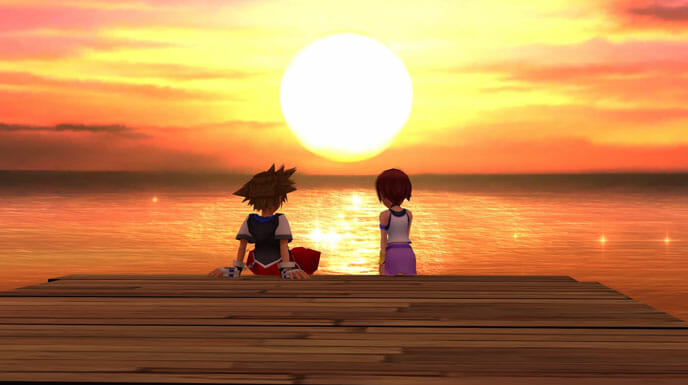Like essentially every other mass media property, Kingdom Hearts is invested in constantly resetting the stakes. Kingdom Hearts 3 may end the “Dark Seeker Saga,” but it also concludes on a massive, spiraling cliffhanger that every game since has had to engage with. Beside the usual bullshit of sequel teases and easter eggs, there are two engines that propel this table setting: misogyny and martyrdom.
The first is self-evident and often commented on. Of Kingdom Hearts’ three heroes—Sora, Riku, and Kairi—it is the girl that gains the least power and has the least to do. Several games’ post-credits teases involve Kairi becoming a more active member of the franchises’ cast, and the payoff to this is always tepid. She is one of the people who reads Mickey’s letter after the credits in Kingdom Hearts 2, but the mission involves only Sora and Riku. At the end of Dream Drop Distance, mentor Yen Sid announces that she is to be trained as a keyblade wielder, but she is sidelined throughout Kingdom Hearts 3 until she dies towards the end. Even the game in which technically you play as her, Melody of Memory, concludes with the spirit of Sora overtaking her body to fight the game’s final boss. While Sora and Riku can make world-ending sacrifices and dive into unknown worlds, Kairi is still stuck training after over a decade of games. (She’s not even in the key art from Kingdom Hearts 3, which you can see above.)
Admittedly, Sora is similarly trapped. He has an unending appetite for saving his friends, even as it puts him in ever-escalating prisons. The end of Chain of Memories sees him needing to reconstitute his fractured sense of self. At the conclusion of Dream Drop Distance, he loses most of his powers chasing illusions of his friends and falling into a trap. He simply has too big of a heart to help himself.
Both these threads culminate in Kingdom Hearts 3, which sees Sora plunge into oblivion to save Kairi from death. This is, of course, far from a final sacrifice. Sora pushed himself into a world of fiction (what the hell that means in a Disney and Final Fantasy crossover is still up for debate), somehow connected to Nomura’s haunted dreams of Final Fantasy Versus XIII. Kingdom Hearts 4 will be set in this other world and presumably involve Sora reaching out to find his friends yet again.
The misogyny here is structural. Although Sora would undoubtedly die for Riku, or really any of his friends, he dies for Kairi. She, unlike essentially every other character in Kingdom Hearts 3‘s grand finale, does not get a big fight to show her stuff or any massive emotional catharsis. She is more exit wound than character, meant to show how the sorrow of her death will lead the product line.
Even so, these elements are not exactly emotional. Sora’s willingness to die and Kairi’s weakness are facts of the world. Even Sora’s friends simply go about trying to save him, in faith that he can be saved. There is sorrow that he is not there with them, but there is also certainty that he is still out there. Sora’s sacrifice is sad, but it is not questioned. Sora does not hesitate. He dives right in. It does not even seem a burden to him.
However, Kingdom Hearts is a ready-made engine for self-identification. Kairi fails in a way that one can twist to be human. We’ve all had friends and loved ones outpace us, leave us behind drenched in insecurity and doubt. This fan animation, which interpolates the song “Hibiscus Tea,” is devastating exactly because it turns the absurd, trite misogyny of Melody of Memory into a confining, personal sorrow. It’s the kind of feebleness you might feel staring into the blank white walls, begging, pleading for your life to change.
I’m inclined to do the same thing to Sora. My song of choice is The Police’s
King of Pain,” with its parade of creatures and objects stuck in positions of death and hurt. Sora is literally, textually, a soldier in a proxy war between old men, a forever martyr who is always destined to die, only to be rescued so that he can die yet again—Jesus Christ as bright-eyed, shonen twink. I imagine him begging for the death to stop, to have more time with Riku and Kairi in peace, without them rushing off to win some war that is not their own. Yet the franchise demands that he will be put in this situation over and over again. King of Pain indeed.
It is silly to write about Kingdom Hearts this way. Yet these are the absurdities it leads us to. For all its faults, and there are many, Kingdom Hearts 3‘s pivot point exemplifies why I cannot look away from the franchise, why it enters my brain at random intervals, why I cry listening to “Face My Fears” on loop. There’s a scene in Kingdom Hearts 3‘s opening cutscene where Sora cuts through the darkness with his keyblade, opening doors of light for several of the franchise’s supporting characters. Even if Kingdom Hearts cannot think it, I cannot help but wonder about how hard it would be to bear that burden of light and how hard it would be to be saved.
Grace Benfell is a queer woman, critic, and aspiring fan fiction author. She writes on her blog Grace in the Machine and can be found @grace_machine on Twitter.
